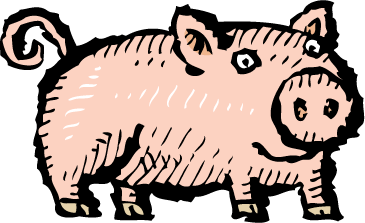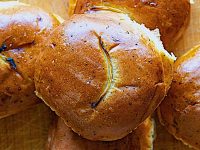Lucky Foods for the New Year
You’ve seen the images: An elderly man wearing a sagging 2012 sash over his thin frame shuffles toward his exit, where the exuberant 2013 babe awaits his entrance. But, the old man pauses in his journey to dispense a few last edible nuggets of wisdom…
In many cultures, the New Year is seen as a new beginning, a fresh start to be carefully ushered in so as to ensure good fortune in the coming months. And what better, more fundamental way to do this than through food? Here is a short list of foods traditionally eaten on the New Year to bring good luck in the coming months:
Fish
For the Chinese, a whole steamed fish symbolizes a long and healthy life. Oysters and prawns are lucky, too!
The Polish serve pickled herring at midnight.
The Italians use dried salt cod in a variety of holiday dishes.
The Germans simply must have carp, which is usually eaten in a stew. They also take the fish thing one step further, and stash a few carp scales into their wallets to keep from running out of money in the coming year.
Legumes
Some believe that feasting on beans, peas and lentils will bring money in the coming year, as their small, round shape is reminiscent of coins in some cultures. And when beans are cooked, they swell and grow larger, which symbolizes increasing wealth.
A popular Southern New Year’s dish is Hoppin’ John, a spicy combination of black-eyed peas and rice.
In Brazil, the traditional first meal of the New Year is lentil soup.
Northern Italians like to eat green lentils and pork sausage at midnight.
Greens
In one of the more obvious comparisons, the leaves of greens are thought to resemble paper money and thus bring financial success.
The American South has long served sautéed collard greens, and the Danes like kale sweetened with cinnamon and sugar.
In countries that celebrate the Persian New Year, fresh herbs are used in rice dishes and oven-baked omelets.
For Germans, cabbage in the form of sauerkraut is a New Year’s staple.
Noodles/Dumplings
In Asia, eating long noodles is said to give you long life. But, you cannot break the noodles when you are eating them or it won’t come true.
To the Chinese, dumplings resemble the gold ingots that were once the country’s currency, symbolizing an auspicious New Year. But this tradition has a downside: If you count the dumplings made for yourself, it will lead to scarcity in the New Year. Also, any bad feelings between family members must be resolved before the dumplings are cooked or evil spirits will steal them.
Pork
The high fat content in pork is considered a sign of wealth and prosperity.
The Germans eat roasted pork and plenty of sausages.
In Sweden, they like pork trotters.
And suckling pig is the favorite in Portugal, Hungary, Austria, and Russia.
Fruit
In Spain, the first stroke of midnight means everyone begins eating grapes in time with the local clock tower’s chimes. The trick is to to swallow all twelve before the last chime, and your year will be prosperous. This custom is also popular in Portugal, Cuba, Venezuela, and several other countries.
In Turkey and other Mediterranean countries, pomegranate symbolizes abundance and fertility.
In China, the words for “orange” and “tangerine” sound very close to “wealth” and “luck” in the Chinese language. No New Year celebration is without them.
Ring-shaped Cakes
Ring-shaped cakes and other baked goods symbolize the completion of year and its never-ending cycle.
The Dutch serve a puffy, apple- and raisin-filled fritter called oliebollen.
The Greeks prefer vasilopita, anise-flavored cake with a coin hidden inside.
The Mexican tradition features rosca de reyes, a sweet, dried fruit-studded bread studded.
We hope your 2013 is happy, healthy, and filled with delicious things to eat!




Zingerman’s Art for Sale